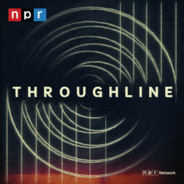
Kultur & Gesellschaft
Throughline Folgen
Throughline is a time machine. Each episode, we travel beyond the headlines to answer the question, "How did we get here?" We use sound and stories to bring history to life and put you into the middle of it. From ancient civilizations to forgotten figures, we take you directly to the moments that shaped our world. Throughline is hosted by Peabody Award-winning journalists Rund Abdelfatah and Ramtin Arablouei.Subscribe to Throughline+. You'll be supporting the history-reframing, perspective-shifting, time-warping stories you can't get enough of - and you'll unlock access bonus episodes and sponsor-free listening. Learn more at plus.npr.org/throughline
Folgen von Throughline
-
Folge vom 29.06.2023After Roe: A New Battlefield (2022)The Supreme Court's decision in Roe v. Wade transformed the landscape of abortion rights overnight. For the doctors, lawyers, feminists, and others who had fought for nationwide legalization, Roe was the end of a long battle. But for the growing movement against abortion rights, it was the beginning of a new battle: to protect the fetus, challenge abortion providers, and ultimately overturn Roe. This is the story of how opponents of abortion rights banded together, built power, and launched one of the most successful grassroots campaigns of the past century.Learn more about sponsor message choices: podcastchoices.com/adchoicesNPR Privacy Policy
-
Folge vom 22.06.2023The Labor Of LoveThere's a powerful fantasy in American society: the fantasy of the ideal mother. This mother is devoted to her family above all else. She raises the kids, volunteers at the school, cleans the house, plans the birthday parties, cares for her own parents. She's a natural nurturer. And she's happy to do it all for free. Problem is? She's imaginary. And yet the idea of her permeates our culture, our economy, and our social policy – and it distorts them. The U.S. doesn't have universal health insurance or universal childcare. We don't have federally mandated paid family leave or a meaningful social safety net for when times get rough. Instead, we have this imaginary mother. We've structured our society as though she exists — but she doesn't. And we all pay the real-life price.Learn more about sponsor message choices: podcastchoices.com/adchoicesNPR Privacy Policy
-
Folge vom 15.06.2023Affirmative ActionThis conversation was recorded ahead of the Supreme Court's expected decision on affirmative action. As of publishing, no decision has been issued.The Supreme Court is expected to rule on affirmative action sometime this month. Most of us understand that some colleges use race as a factor in college admissions. But journalist Jay Caspian Kang argues that this focus is too narrow, and that it avoids harder conversations we need to have as a culture. In his view, focusing on the admissions practices of a select few universities creates "a fight for spots in the elite ranks of society" — and blinds us to the bigger problems plaguing American democracy. On today's episode, we talk with Kang about affirmative action's origins in the civil rights era, what it does and doesn't achieve, and what a more equitable education system could look like.Learn more about sponsor message choices: podcastchoices.com/adchoicesNPR Privacy Policy
-
Folge vom 08.06.2023Before Roe: The Physicians' Crusade (2022)Abortion wasn't always controversial. In fact, in colonial America it would have been considered a fairly common practice: a private decision made by women, and aided mostly by midwives. But in the mid-1800s, a small group of physicians set out to change that. Obstetrics was a new field, and they wanted it to be their domain—meaning, the domain of men and medicine. Led by a zealous young doctor named Horatio Storer, they launched a campaign to make abortion illegal in every state, spreading a potent cloud of moral righteousness and racial panic that one historian later called "the physicians' crusade." And so began the century of criminalization.In the first episode of a two-part series, we're telling the story of that century: how doctors put themselves at the center of legal battles over abortion, first to criminalize — and then to legalize.Learn more about sponsor message choices: podcastchoices.com/adchoicesNPR Privacy Policy
